- Includes 20 questions
- Contains 1400 words (2 passages x 700 words)
- Provides 36 minutes to complete everything
After years of trial and error, we have come up with a fool-proof system designed to help students just like you answer every single question in the TOEFL Reading with time to spare.
By the end of this short article, you will know exactly what you have to do to ensure that you never miss a single question on the TOEFL Reading.
Prefer a PDF guide?
You can download Your Guide to Time Management for the TOEFL Reading Section – PDF right here.
Here is a quick rundown of our top ten TOEFL Reading tips:
Rule #1: Take notes and circle
When you take the TOEFL, you get a pencil and a piece of scrap paper.
Use it!
Your task in the TOEFL reading section is more about eliminating choices than answering questions, though most students don’t look at it this way. You need to track the choices that you eliminate. And you can do this by taking notes.
Take a look at the example below:


Not a lot of notes, right?
All you have to do is write down the question numbers and the choices you eliminate.
You do NOT have to write any notes about the actual content of the reading text.
Here’s how it works.
When you answer the questions in the TOEFL Reading, eliminate choices you believe are incorrect. Once you eliminate one, write it down on the scrap paper. This is an easy way to narrow your focus on the remaining choices.
For example, according to my notes, in question one, I eliminated a and c, so I crossed them out.
You do not have to do this for every question. You can see that for question three, I haven’t eliminated anything, and that is because the question was easy. Feel free to do the same on questions that require less focus and strategy. Don’t waste time writing notes about questions when you know the answer.
The most important component of this note-taking system is the circled questions.
Question numbers two and eight are circled because I’m not confident with my answer. You see, on test day, you have a limited amount of time to answer all of the questions. There will be some questions that will take more time to answer. Instead of wasting time thinking about how to answer, just circle the question number in your notes, select the best choice, and move on.
Do NOT skip the question.
Skipping questions will put pressure on you to allocate time, in the end, to go back and answer the ones you missed. Answer the question and circle it in your notes so you can pinpoint the exact questions you need to think more about after you have finished answering everything.
We will talk more about monitoring your time soon so you know when to answer and move on, but for now, plan to have a couple of minutes at the end of the 36 minutes to go back to a couple of questions and double-check your answers.
Rule #2: Watch the clock
- Vocabulary – 60 seconds
- Detail – 90 seconds
- Negative Detail – 120 seconds
- Paraphrasing – 120 seconds
- Sentence Insertion – 120 seconds
- Inference – 90 seconds
- Author’s Purpose – 90 seconds
- Pronoun Reference – 60 seconds
- Summary – 120 seconds
- Organization – 120 seconds

Even though this time breakdown is good to keep in mind, you do NOT have to look at the clock and count down the seconds for each question. That will only waste time and distract you from focusing on the content of the question and the passage. Instead, you should think of the time in terms of 18-minute chunks.
You will have two passages, 20 questions, and 36 minutes to answer. Answer 10 questions (one passage) every 18 minutes.
Here’s a chart outlining where you should be in five-minute-intervals.
TOEFL Reading Section (20 questions) |
|
|---|---|
| 5 minutes | 3 questions |
| 10 minutes | 6 questions |
| 15 minutes | 9 questions |
| 20 minutes | 12 questions |
| 25 minutes | 14 questions |
| 30 minutes | 17 questions |
| 35 minutes | 20 questions |
Ideally, you want to leave yourself a few minutes at the end to go back to the questions you circled. If you are ever unsure of your progress in the reading section, note that on the top middle of the screen will be the question number followed by the total amount.

Focusing on having a rough idea of the number of questions you want to answer every 5 or 10 minutes. Remember, some questions take longer to answer than others, like TOEFL Reading summary questions. Be sure to have a plan for answering each question type.
Rule #3: Never skip a question
This was touched upon in rule #1, but it is so important that I have made it a rule of its own.
Never skip a question.
Our brains like stories. Stories have a beginning, middle, and end.
The questions in the TOEFL reading section go in sequential order, just like a story. When you skip a question, you interrupt the story. It makes the questions that come after the one you skip more difficult to answer. So, instead of skipping questions, you guesstimate.
Yes, guesstimate is a real word. You can ask Mr. Webster. Basically, you have an idea of what the answer might be, but you are not 100% certain. A guess is a blind chance, a guesstimation is made after some thought.
After you guesstimate, circle the question in your notes (like questions two and eight depicted under rule #1), and move on. Keep in mind that your goal is to answer all of the questions. If you skip a question, you can only lose points.
Rule #4: Review your answers
Allocate a few minutes at the end of the reading section to go back and check over your answers one more time. There are four buttons in the top right corner of the test screen; click “Review” to see all the questions listed.
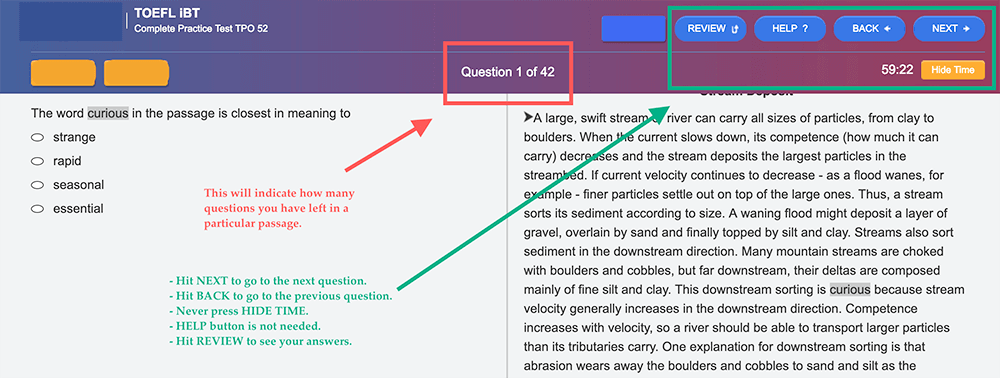
The review page will indicate the questions you answered and the ones you skipped. Check out an example of what the review page will look like.
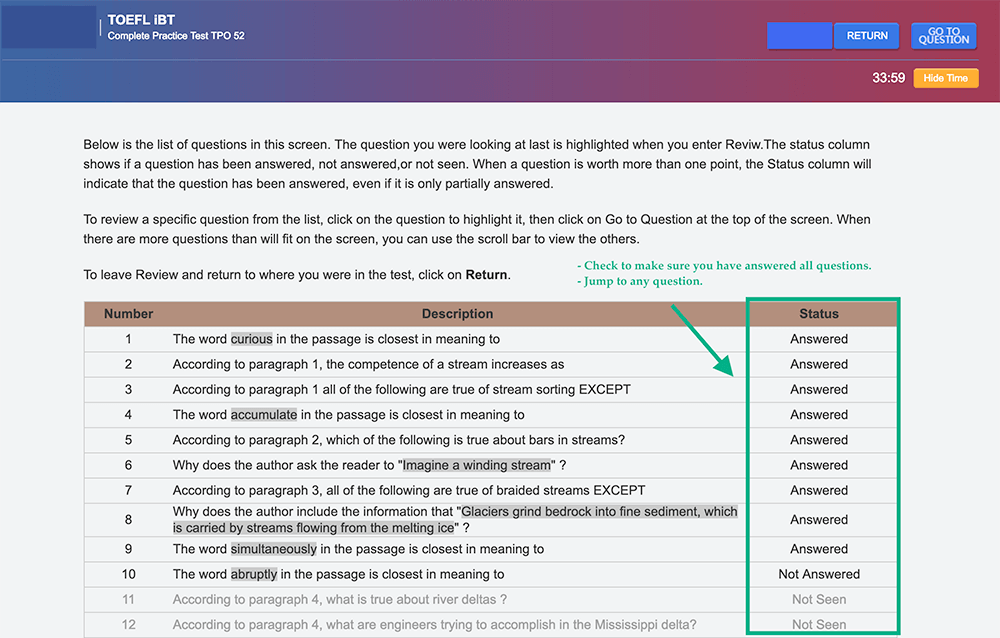
On the review button page, you will find all of the questions listed. If you did skip a question, it will be mentioned on this screen. In the last few minutes, go back to the questions circled on your scrap paper and double-check your answers.
Since you took notes and circled questions you wanted to review, it will be easy to jump around to specific questions from the review page.
*Bonus Rule: Read and answer at the same time
You do NOT have enough time to read the passage and then answer the questions.
This is crucial, so I’ll say it again.
If you read the passage first without answering the questions, you will run out of time.
So, what should you do? First, take one or two minutes to scan the passage so you have a general sense of the topic of the reading passage. Pay attention to the title and the first sentence of each paragraph.
After that, start answering the questions while reading at the same time. The questions go in sequential order, so you can comfortably answer and read together.
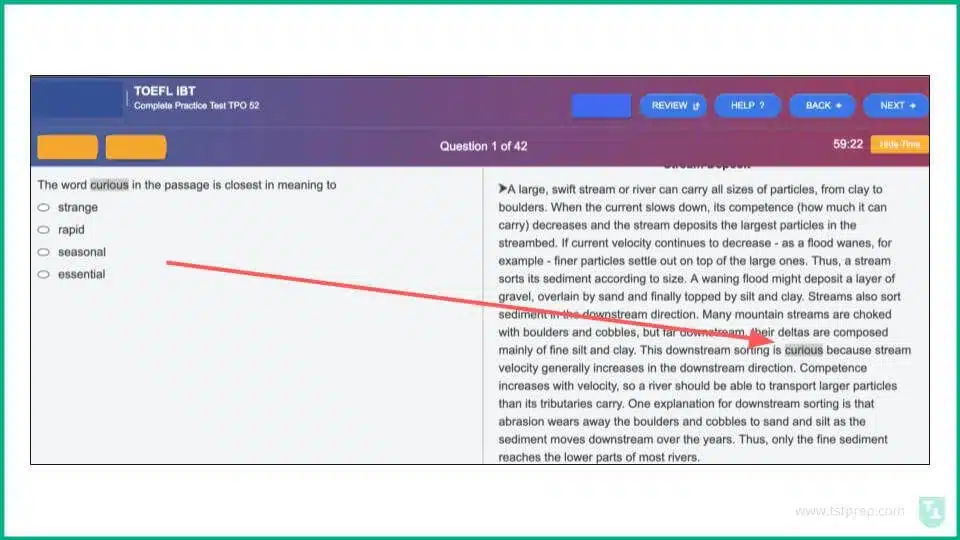
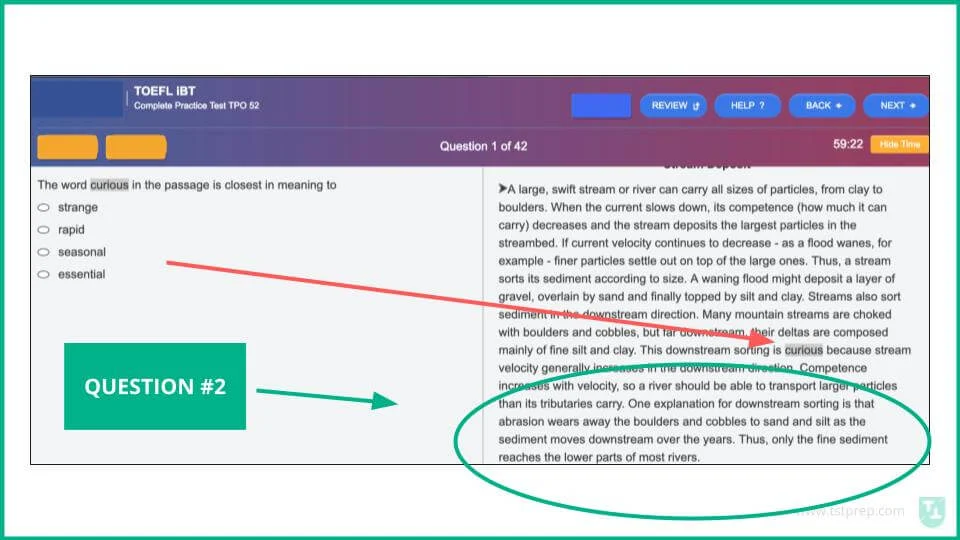
This will help you save time and answer every question before the clock runs out.
In Conclusion
- Use your scrap paper to take notes
- Circle questions you need to review
- Answer 10 questions every 18 minutes
- Leave a few minutes at the end to review
- Guesstimate and review later
Now that you know how to manage your TOEFL Reading time, let’s practice.
Practicing will help solidify this new information into your memory so you can actually apply it on test day.
The more you know the less you fear. Download our free and complete Practice test.
Or, if you feel like you want to learn more cool TOEFL Reading tips and tricks like this, check out our Ten Awesome Tips for the Reading Section of the TOEFL Test.
I know this TOEFL stuff can get a bit frustrating sometimes. So don’t hesitate to reach out and let me know if you have any questions or concerns: contact@tstprep.com
Did I miss anything? Or do you have a comment?
Please add your ideas in the comments section below.
I promise to respond to every single one!



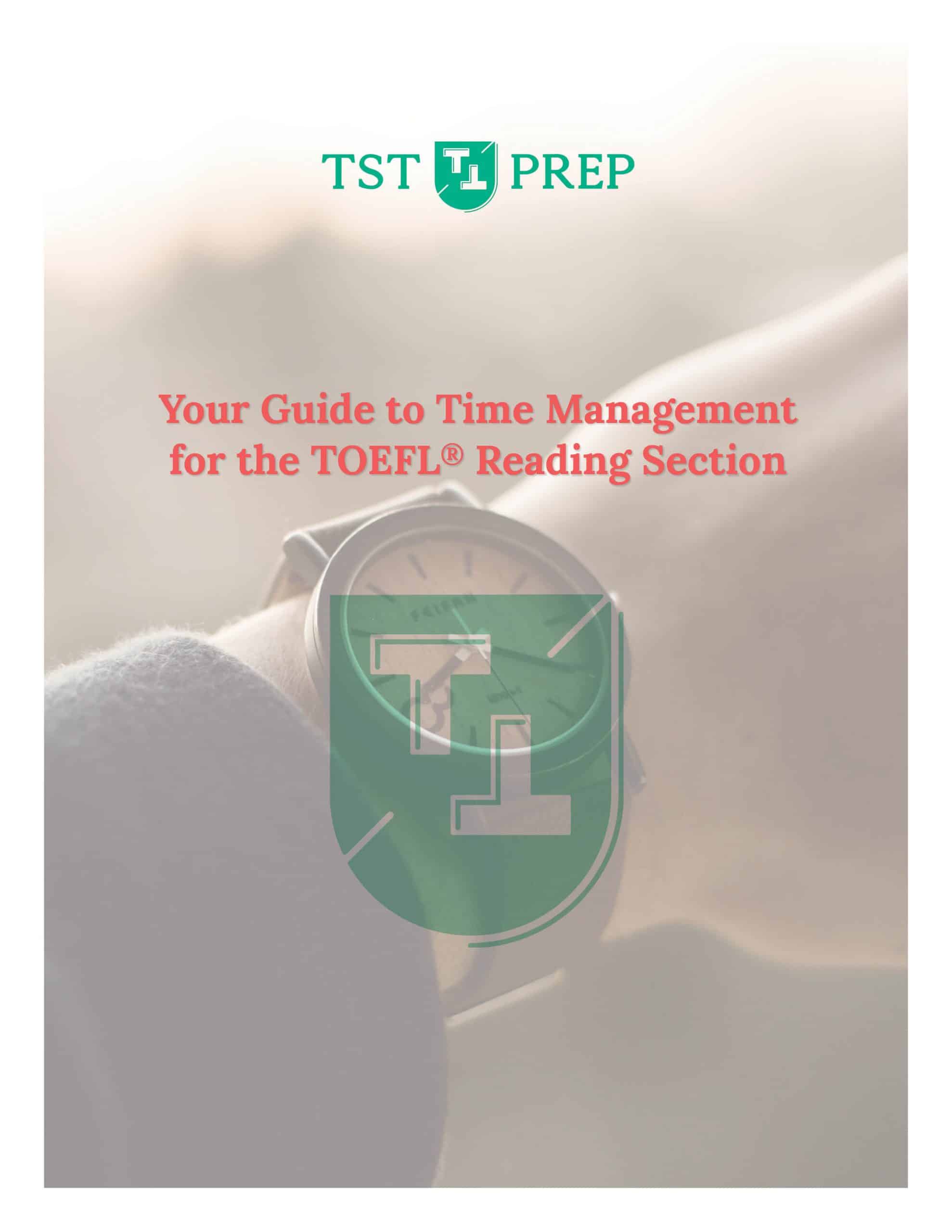
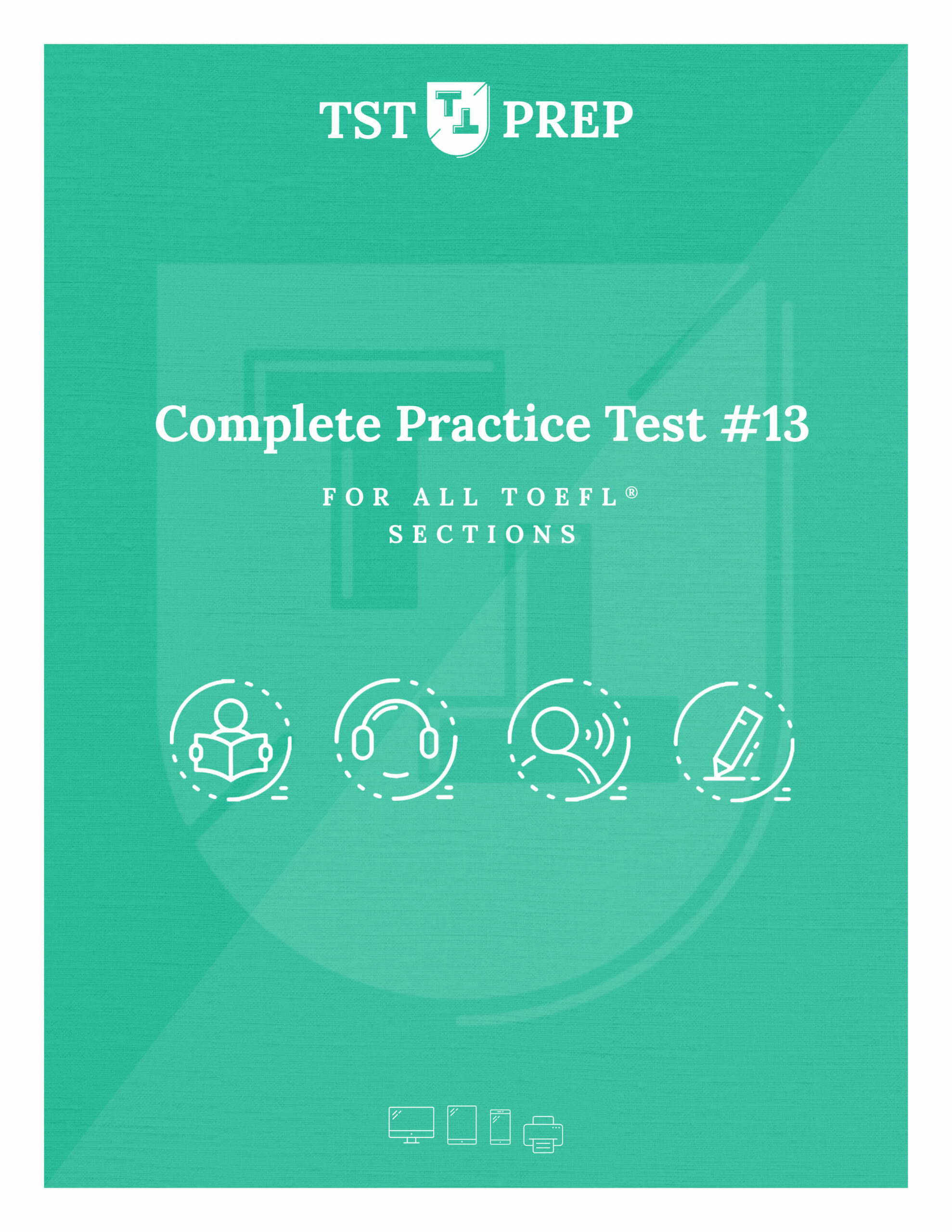





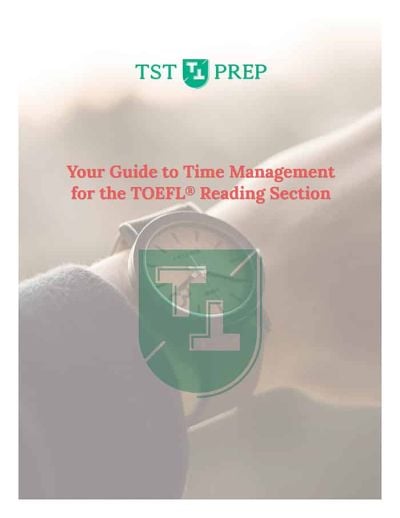
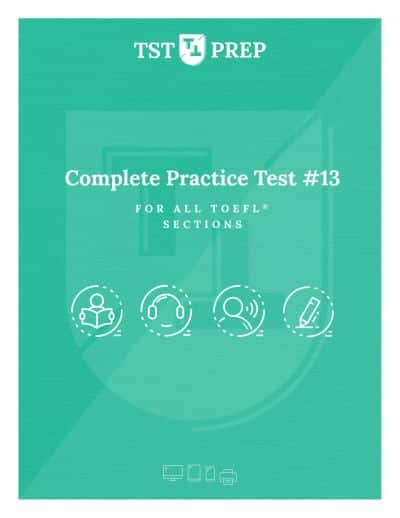
31 Comments
Selin
Josh, Amazing job ! I have just made these mistakes in the exam one week ago, and guess what, my other sections were amazing, however the reading part was a disaster 🙁 If I need to get one more TOEFL, than this piece of work will be a great helper!
Josh
Hi Selin and thanks for the comment (sorry this article came out a little late for you). I hope you did well and let me know if there are any other types of articles you think would be helpful for students in the future.
Raquel
Hey Josh! Your tips are really helpful! I’m brazilian and I made the exam one week ago and I did 71, but I need to get 79 =(. I’ll retake the test on May 4. Do you think it is possible to increase my score in this short period? Should I invest in my weaknesses (writing and speaking) or try to increase what I have been reasonably well (reading and listening)? Many tks, you are the best!!
Josh
Hi Raquel and thank you for your question. It’s a good one.
Well, 8 points is quite a jump. It is true that some tests are harder than others so it is definitely possible to perform much better the second time around, especially after getting used to the test center, test conditions, etc.
The fastest way to improve your score is to work with a teacher (or on your own if you must) on the speaking and writing sections. The speaking and writing provide the most opportunity for students to do well since much of the score is based on the organization of your responses and your performance on test day. If you work long and hard enough on the speaking and writing, you can find templates, even memorized portions of previous answers and use them on test day.
The reading and listening are much harder to improve since low scores in these areas usually imply a lack of vocabulary comprehension, which is harder to fix because it is less about performance and more about comprehension.
I hope this addresses your concerns. Thanks for the support and let me know if there’s any other way I can help.
Raquel
Josh,
As a miracle, I received the confirmation that my score 71 was accepted for the doctoral scholarship that I applied, so I will not have to retake the test . Next year I’ll go to Montreal, Canada (6 months) . I want to thank you again for your work and wonderful teaching. Even with an intermediate level of English, I had progress in the test because I saw all your videos on youtube (ninja and tst prep) . Thank you so much!!!
Atanga Ghislain
Hi sir.
I am a cameroonian taking the TOEFL this Saturday 19th of October.
A friend said he took the test last Saturday he wasn’t given any questions on the speaking.
Please is. This possible?
Josh
No, it’s not possible unless they are not taking the TOEFL ibt. I think the paper-based version of the TOEFL does not have speaking questions, but I really don’t know much about the paper-based (pbt) version of the test.
Hema
Josh, thank you so much for the helpful article. I am seriously started reading your tips. I got my score 70 and yet to achieve 79 to enroll the university . Am struggling with managing time in reading part . Hope after going through these tips , my next attempt would be succeeded. I have a question for the writing portion , should be strict into 350 words ? Few article says that if you don’t have strong writing skills , recommended to go for 450 to 500 words ? Last attempt I had given my good effort with limited words and score 16. Am confused about the strategy of writing section . Please advise
Josh
Hi Hema and thank you for your question. I would say that you should go with the strategy you feel most comfortable with. 450 words are quite a lot and not too many students can write so much in so little time. However, more words do tend to help your score.
The best possible thing you could do for writing is to write essays and get feedback from a teacher, either from us or from someone you know who can provide feedback on your writing. I hope that helps.
Davlamad Sirojiddinovich
Hey,Hema
Could you please share with us how you achieved 70 score?
Ali
hey Josh, I have the toefl test in the next month, i really don’t know how to practice on writing and speaking sections, your videos on youtube are so helpfull but i having trouble in understanding the templates, So could you please help me or provide for me a way to study well for those to sections
Josh
Hi Ali and this is a great question. Speaking and Writing are the most difficult sections to study on your own. The best way is to work with a teacher, share your responses, and get feedback on those responses. https://tstprep.com/toefl-store/toefl-writing-evaluations/
However, if that is out of your budget, then I would suggest for the speaking, recording your responses and suing the grading checklist in this PDF – https://drive.google.com/open?id=1f94h_xTYAZh3lwjp7Y3sPWUCNm4RUuR3
FOr the writing, using a spelling and grammar checker, or you could invest in a Grammarly premium account which will give you more detailed feedback on your sentences, paragraph, and essay structure – https://www.grammarly.com/premium
I hope that gives you some ideas.
Davlamad Sirojiddinovich
Hey, Ali
What happened with you?
Did you take test?
Batool
Hi Josh,
My test is due for Thursday and I am still struggling- whether to read the whole passage first and then respond or read the questions and then look for the answers. Last month I took Toefl ibt home edition and i struggled with the reading passages. For the first passage , I read the whole passage and then tried to answer. For the second passage, I read the question and then replied. In the second passage, I felt I didn’t comprehend the ideas discussed in the passage – frustrating.
Josh
Hi Batool and this is an excellent point. You will have to find a style that works for you, but most students agree that it is nearly impossible (time-wise) to read the article and then answer the questions. I recommend skimming the passage and scanning paragraphs while you answer, so you can have some idea about the passage while answering. This is easier for some to do than others, but it is what we usually recommend. I hope that makes sense.
Alexandra Kleinova
Hi Josh.
Its Alex here. I have been following you on YouTube for some time and wanted to thank you for all the help you have given me and students all around the world.
On the other hand, I would like to ask for some additional help. I have been stuck with the reading section and just cannot get the needed score.
Can you please send me an email which of your courses would be the best to practice some more?
Josh
Hi Alexandra and thank you for your kind words. About the reading, I will send an email to you directly with some additional practice that will help build your reading skills.
Anas Almohammad
Dear Josh,
Thank you very much for your efforts and good videos. I have one traditional question; should I read all the passages or just the first sentences in each paragraph. I have applied the TOEFL exam last time and got 72 (speaking, Writing, Listening, and Reading; 21:19:17, and 15 respectively) but I need for my ph. d (78). Could you please tell me how can I increase my score especially that my next exam will be on September 11?
Thanks in advance,
Anas ALMOHAMMAD
Josh
Hi Anas and thank you for your comment. Improving 7 points in a week is tough, but I would focus on your speaking and writing. Those skills are productive, based on your own performance, whereas listening and reading scores are based on texts given to you and largely based on the amount of vocabulary and fluency you currently possess with the English language. If you had more time, I would also recommend enrolling in our TOEFL Reading Score Builder Program. It will be released next week but requires at least a month of hard work to see some benefits. I hope that helps!
Iftikhar Ahmad
Dear Teacher, when a reading Passage opens up, 3 Questions or Options always come to my mind: Should I immediately go to and read question 1 without knowing anything about what in the passage is? Should I first read only the topic sentences of the passage and then go to read question 1? Or should I first just scan the entire passage to have a better grasp of what the passage is really about and then secondly go to Question 1 to answer?
Please tell me which option you prefer to be applied.
Josh
Hi there Ahmad and great question. Opinions vary on this topic. To be honest, since you know about all of these strategies, I would advise you to pick the one you feel most comfortable with. I usually recommend scanning the passage, but some students prefer other methods and score very high as well. Go with what works for you.
Snehal Kale
Hi Josh, first of all, your videos are excellent practice sources.
According to the new change after July 26, 2023, there are two passages. Then how are the scores calculated, raw score and scaled score? Because we just practice and practice, but we are unaware of how much we score.
Josh
Hi. I am glad you find the resources helpful. It is true you can’t figure out your exact score just by practicing. You can get a general idea if your answer aligns with the samples ETS provides, but that would not help you calculate a score. One option that might be helpful would be to arrange an essay evaluation with us, where a teacher will grade your essay, This should give you a reasonable idea of your level. Hope this helps 🙂 https://tstprep.com/store/toefl/toefl-writing-evaluations/
Amiry
Dear Josh, I am going to take the test in 10 days. I usually lag behind the given time (about 4 minutes more to complete ). I took a practice reading test recently and got 22 with four unanswered questions. However, by continuing the same practice test again, I got 27. This implies that I can score even higher if I can solve the Time problem. Show me your magic, please. I am waiting.
Josh
Hi Amiri, I certainly wish I had magic. 🙂 I would say that you need to learn how to scan for an answer versus reading for it. It’s a skill that takes time and practice. You might want to consider our group reading classes as this is covered in detail.
Mariel Mejia
Hi Josh,
I’ve been watching videos with tips and tricks for the reading section. Most people recommend reading the questions first and then searching for answers in the passage. However, I’ve realized that this makes me miss important details—especially for the final question, where you need to select 3 options to create a summary. What would you suggest I do in that case?
Josh
A very good question. Of course, if the test were untimed, you would be wise to read everything. However, most people cannot read and answer everything in 36 minutes. So scanning is your best option. If you have some free time on Sunday, we have a free webinar all about the last reading question. Maybe you can join us? 🙂
https://tstprep.zoom.us/webinar/register/WN_hBN1_ACzRcOfOQnF4BA23g